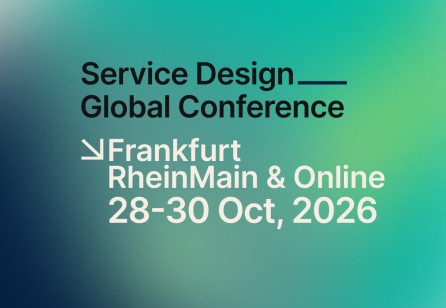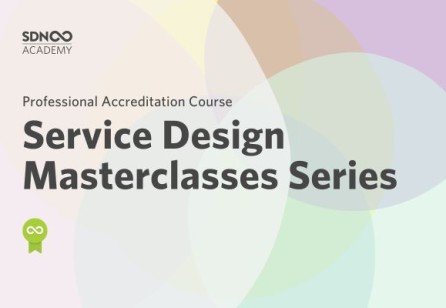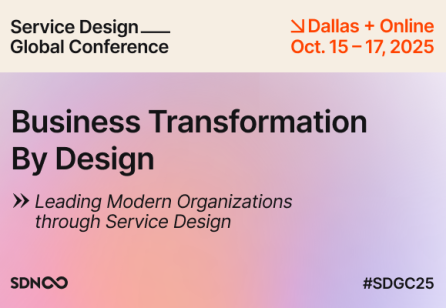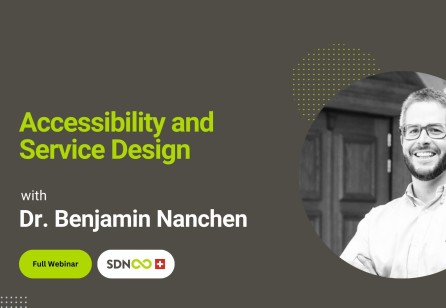Touchpoint 15-2 Call for Papers: ‘Achieving Interdisciplinarity’
Service designers work within a unique context. Because our work influences service innovation, improvement and delivery across lengthy and often complex customer lifecycles, we must work closely with stakeholders from across our organisations, and even beyond. While we aim for deep expertise in our own practice, we must also familiarise ourselves with the ways many others work. Engaging them throughout discovery work, involving them in co-creation and testing, and - finally - collaborating with them to ensure implementation is a success.
This interdisciplinary approach is a hallmark of service design. It recognises that only through close cooperation can the broad impact of service design be successfully achieved. Interdisciplinarity can be a challenge; a mandate and high-level support is often a prerequisite, and further time is needed to understand and constructively engage with those whose work is very different from ours.
How can we successfully initiate and facilitate ‘interdisciplinarity’, expanding our practice and achieving greater impact? That is the theme for the next issue of Touchpoint.
We are interested in proposals for articles that address some of the following questions, amongst others:
- How is interdisciplinarity anchored in project agreements, and how is the appropriate mandate and the high level support achieved?
- What are prime examples of service design (-lead) projects that embraced a truly multidisciplinary approach? What did those look like, and what was the impact and outcome?
- Which challenges have you faced and how did you successfully overcome them?
- What tools, frameworks and methodologies exist to help service designers immerse themselves in practices both near and far from our own?
- How can interdisciplinary collaboration be successfully achieved within a specific project context (e.g. activities, deliverables, collaboration techniques, etc.)?
- What team structures and organisational design approaches are best suited to fostering interdisciplinary collaboration? Think of embedded, distributed or centralised (service) design teams, for example.
- Are there measurements for the value of interdisciplinarity?
- Does current service design education adequately prepare tomorrow’s service designers for multidisciplinary and collaborative ways-of-working? How is this being achieved?
- What are the key challenges faced by service designers when integrating emerging technologies, such as AI, IoT, blockchain into multidisciplinary projects? And how can these challenges be effectively addressed to leverage the full potential of such emerging technologies within service design?
- How are the principles of sustainability and social responsibility being woven into multidisciplinary projects, and how can others learn from these techniques?
- How do cultural differences and diverse perspectives impact interdisciplinary collaboration in global service design projects? What strategies can be employed to navigate and leverage cultural diversity effectively in order to enhance project outcomes and stakeholder satisfaction?
We welcome contributions from throughout the service design community, as well as those with knowledge and experience in this theme, to contribute to this issue. By doing so, you will be helping service designers make the next step towards an even more mature practice of our discipline.
Regular sections
Besides handing in articles related to this issue’s feature, you are also invited to hand in content for the other regular sections of Touchpoint, which are not related to the theme of the issue:
- Cross-Discipline: Highlighting the connection between service design and other disciplines
- Tools and Methods: Introduction and evaluation of techniques and activities for service design projects
- Education and Research: Insights from academia and research.
Abstract submission:
Read more and submit your abstracts via the online form until 26 April 2024 (23:59 CET).
We are looking forward to many inspiring contributions!
Editorial Timeline Vol 15-2
08– 28 April | Submission of abstracts
28 Apr–03 May | Review of abstracts by Editorial Board
03 May – 07 June | Submission of articles
10 – 21 June | First review of articles by Editorial Board
24 Jun – 05 July | First round of editions by authors
05 –12 July | Second review of articles by Editors
12 Jul–19 Jul | Second round of editions by authors
19–26 Jul | Final review and approval of the article by Editors.
29–16 Aug | Proofreading
20 Aug – 03 Sep: Layout phase.
05 Sep | Publication online and print







Share your thoughts
0 RepliesPlease login to comment